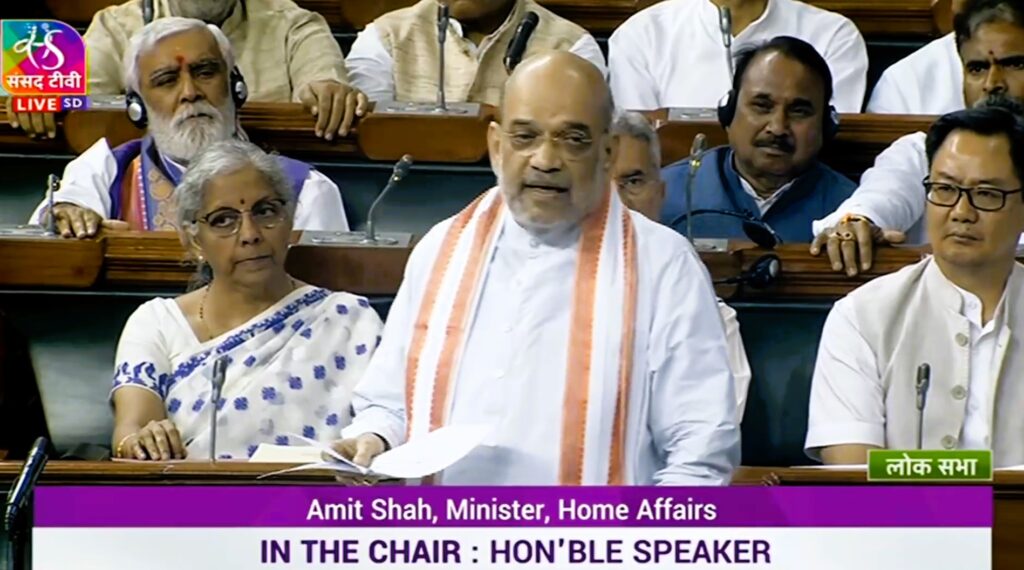New Delhi: Marrying a woman by concealing identity or having intercourse under false promise of marriage, promotion and employment will be treated as crime for the first time under the proposed law that will replace the colonial-era Indian Penal Code, Home Minister Amit Shah said on Friday.
Introducing the Bharatiya Nyaya Sanhita (BNS) Bill, which will replace the IPC of 1860, Shah said a special focus has been given to provisions related to crimes against women.
“Crime against women and many social problems faced by them have been addressed in this bill. For the first time, intercourse with women under the false promise of marriage, employment, promotion and false identity will amount to a crime,” he said.
While courts have dealt with cases of women claiming rape on the basis of breach of promise of marriage, there is no specific provision for this in the IPC.
The bill, which will now be examined by a Standing Committee, states: “Whoever, by deceitful means or making by promise to marry to a woman without any intention of fulfilling the same, and has sexual intercourse with her, such sexual intercourse not amounting to the offence of rape, shall be punished with imprisonment of either description for a term which may extend to ten years and shall also be liable to fine.” It further states that “deceitful means” shall include the false promise of employment or promotion, inducement or “marrying after suppressing identity”.
Senior criminal lawyer Shilpi Jain said this provision was long overdue and due to the absence of such a provision, cases were not regarded as a crime and were open to a lot of interpretation from both sides.

While some saw the specific provision about “marrying after suppressing identity” being targeted at cases of interfaith marriages under false names, Jain told PTI that would be open to interpretation.
The key point here is that consent of the victim taken under false pretence cannot be termed voluntary, she said.
“Women are being exploited in our country by men who have sex with them after promising them marriage and it’s an offence if men at the time of making the promise had no intention to marry,” she said.
Jain, however, said that clubbing false promise of marriage with promise of employment or promotion in this provision may not be the right way to go forward.
“Promise to marry cannot be equated with promise of employment/ promotion because promise of marriage is based on love, trust, while promise of employment/ promotion are benefits which women are accepting in return for sex. It’s a relationship of mutual benefit.
“When a woman knows what she is getting into — that is sex for employment or promotion — then it is not under deceitful or false promise,” she says.
The proposed bill has also made the crime of voyeurism gender neutral with a punishment of three to seven years.
Shah also said the changes were brought in to provide speedy justice and create a legal system that keeps contemporary needs and aspirations of the people.
“In all cases of gang rape, there will be punishment of 20 years to life imprisonment. In case of rape of girls less than 18 years of age, the punishment will be death,” he said.
The bill states that the crime of murder will invite death sentence or life imprisonment, crime of rape shall be punished with minimum 10 years of jail or imprisonment for life and gang rape will invite at least 20 years of imprisonment or imprisonment for the remainder of the convicted person’s natural life.
According to the bills, if a woman dies after the rape or it causes the woman to be in a persistent vegetative state, the convict shall be punished with rigorous imprisonment for a term which shall not be less than 20 years, but which may extend to imprisonment for life, which shall mean imprisonment for the remainder of that person’s natural life, or with death.
Whoever commits rape on a girl under 12 years of age shall be punished with rigorous imprisonment for a term which shall not be less than 20 years, but which may extend to imprisonment for life, which shall mean imprisonment for the remainder of that person’s natural life, and with fine or with death.
Anyone who commits rape shall be punished with rigorous imprisonment of not less than 10 years, but which may extend to imprisonment for life, and shall also be liable to fine.
If a police officer or public servant or member of the armed forces commits rape, he shall be punished with rigorous imprisonment for a term which shall not be less than 10 years, but which may extend to imprisonment for life.
PTI
